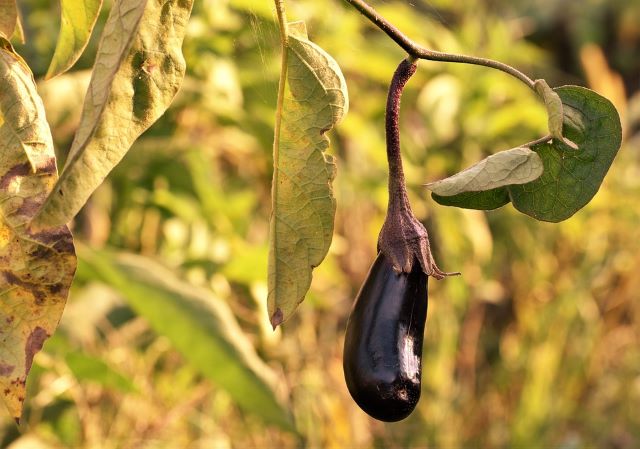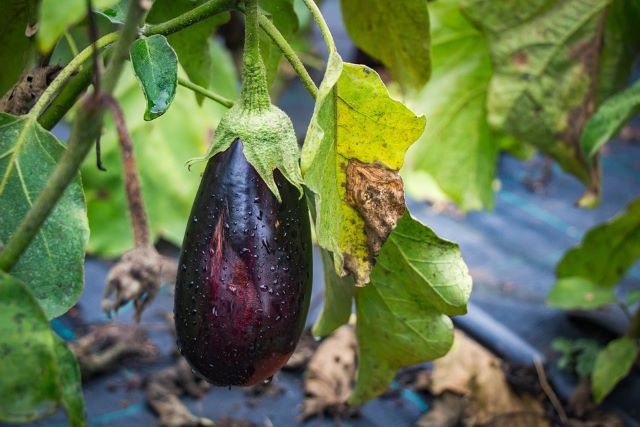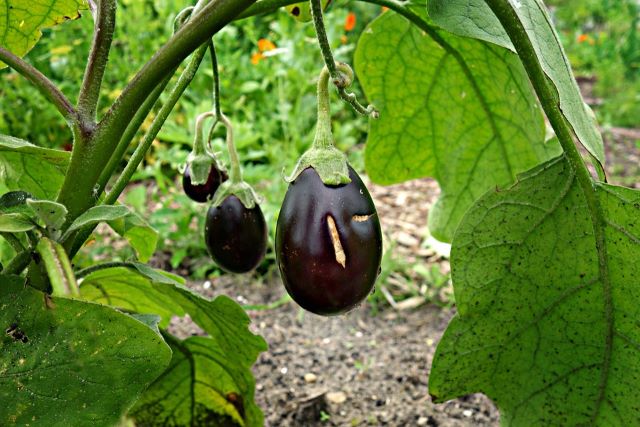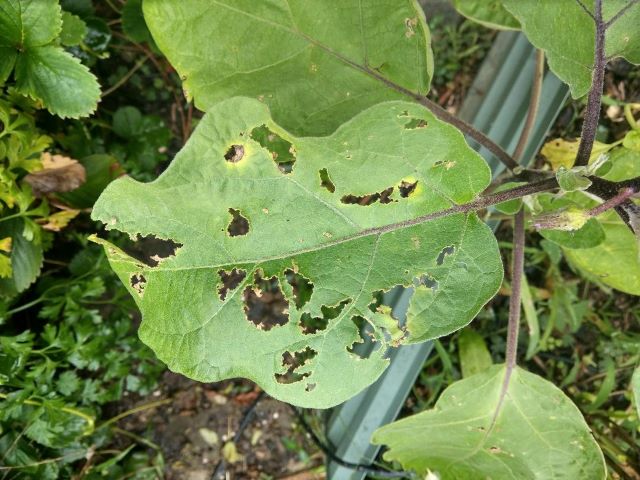Eggplants are a delicious vegetable garden addition, often prized for their versatility in cooking. But eggplants can also be sensitive and can run into growing problems and fail to thrive. So if you’re wondering why your eggplant is dying, you’ve come to the right place. In this article, I’ll explain potential reasons why your eggplants might be dying, and what you can do about it.

The most common causes for dying eggplants are watering issues, temperature problems, lack of sunlight, or eggplant pests and diseases.
Luckily, most of these issues can be fixed and you can bring your eggplants back to full health.
Table of Contents
Watering Issues Cause Eggplants to Die
If your eggplant is dying, watering issues should be the first thing you assess.
When given too much water, eggplants will wilt and drop, and the roots (and possibly even stem) might change color and become weaker. This can also lead to root rot. Eventually, if not treated, the eggplant will die.
Eggplants need about one inch of water per week. Sometimes, in hotter climates or sandier soil, they will need more. You should be watering them when the top inch of soil is dry.
It’s better to do a few big waterings, rather than many shallow ones, as you want the water to soak deep into the soil and encourage the roots to grow deeper and stronger. So water your eggplants when the top inch of soil is dry, and give them a healthy amount.
If your eggplants have been overwatered, the best thing to do is to let them dry out. Not completely, of course, but give them some time to recover without having waterlogged roots. As long as it hasn’t progressed to root rot, this will help.
On the other hand, it’s also possible to underwater eggplants. Underwatered eggplants will display similar signs of sun scorching: the leaves will wilt, then dry and turn yellow, eventually falling off. This means your eggplants are in need of more water; simply give them some and they should be good to go!

Cold Temperature Cause Eggplants to Die
Eggplants grow best in soil temperatures that are above 75°F (24°C), with average nighttime temperatures that are over 65°F (18°C). As such, they often grow well in more southern regions of the US.
If the air or soil is too cold, it will cause growing problems for eggplants. They can wilt, have stunted growth, and even die. So make sure you have the right temperature for planting eggplants. If necessary, start them indoors and wait until it is warm enough to take them outside.
Sudden Climate Changes Causes Eggplants to Die
Similar to temperature problems, sudden changes in temperature or climate can harm your eggplants. They like heat and are more sensitive than some other plants, so sudden changes can shock eggplants and leave you with a dying eggplant.
One of the most common ways this occurs is through cold snaps. If it’s been warm enough to have eggplants outside, but the temperature suddenly changes and drops lower, it can shock the plants. This might cause stunted growth, but will also commonly cause wilting and even death in eggplants.
Another danger is transplanting eggplants outdoors too early or without preparation. Make sure you wait until at least six weeks after the last frost to take your eggplants outside.
And if you are transplanting them from indoors to outside, make sure you harden them off first. This involves exposing the seedlings to outdoor air and conditions a little bit at a time, to prepare them for living outside. As an example, put your eggplant seedlings on the porch for just a few hours in the morning for a week before transplanting them.
Sudden increases in the wind can also harm eggplants, especially young ones. I like to have a fan gently blowing on my indoor seedlings, to help accustom them to the wind before they go outside.
So whether it’s cold snaps or transplanting, make sure your eggplants aren’t exposed to any drastic temperature changes that could harm them.
Related reading: Hardening Off Seedlings (& Avoiding Transplant Shock)
Lack of Sunlight Cause Eggplants to Die
Eggplants like full sun, meaning they should get at least six hours of direct sunlight every day. If they don’t get this, they won’t grow to their full potential and could start wilting and dying.
This means that eggplants should be planted in a bright, sunny location, and not be surrounded by other plants that could block the sun. You don’t want to plant them near a shady corner or surround them with big-leafed plants like cucumbers.
Instead, make sure your eggplants have plenty of room to soak up sunlight and are in a position where they can get a lot of it. This way they get everything they need for healthy growth.
You can also check out our article on How To Grow Eggplant for an in-depth discussion on eggplant’s ideal growing conditions.
Eggplant Pest Attacked Can Cause Them to Die

There are a variety of pests that can bother eggplants and cause them to die. Here are some of the most common ones, how to spot them, and what you can do about them.
Aphids and Whiteflies on Eggplants
These small insects are often found on the underside of eggplant leaves. They’re very small and thus hard to see, but they leave behind some telltale signs.
First, you will notice small dark or discolored spots on the leaves, where the pests are sucking out the sap. A dark-gray mold could grow here. Additionally, they will leave behind a sticky white substance known as honeydew, which can attract other pests to your eggplants.
If left unchecked for too long, these insects will kill eggplants by continuing to suck the sap out of the leaves. Luckily, treating them isn’t too difficult. You can wash your eggplants off using soapy water, which won’t harm the plants but will get rid of the insects.
You can also try spraying eggplants with horticultural neem oil. This will kill the pests, and prevent them from spreading. As long as you cut them off in time, your eggplants will be able to bounce back just fine.
Flea Beetles on Eggplants

These beetles love to snack on eggplants. Flea beetles chew on the eggplant leaves and leave behind large holes, which are easy to spot. They’re easy to spot, as they simply look like tiny black, brown, or blue beetles, which stand out against the green leaves of eggplants.
For young eggplants, flea beetles can cause a big problem, because they’ll eat the leaves fast enough to cause a lot of damage. Older eggplants are larger and can sometimes withstand the damage, but it’s still a good idea to get rid of the flea beetles.
First, you should make sure to clear any weeds from around your eggplants, as this provides flea beetles with a place to live. To get rid of them, you can simply pluck them off by hand and plop them into a bucket of soapy water.
Or, if you don’t want to pick them off by hand, you can try placing sticky traps like these around your eggplants to trap the beetles. These traps can catch all kinds of insects, though, so be careful when using them.
Stink Bugs and Leaf-Footed Bugs on Eggplants
These insects are common household pests, as well as garden pests. Unlike other pests, they tend to feed on the young fruit of the eggplant, not the leaves. This causes discolored spots that can be hard to see at first but are very obvious once the plant is cut open.
Like with flea beetles, a small amount of these insects likely won’t cause too much damage. But if there are a lot of them, they can overwhelm eggplants, so it’s good to take care of them as soon as you can.
Once again, make sure the surrounding area is clear of weeds. You can pick them off tongs and pop them in a bucket of soapy water, or try using sticky traps. Stink bugs can stray you so be sure to wear protective clothing and eyewear if you are picking them off with tongs.
Another alternative is to attract helpful wasps that will prey on the pests— as long as you don’t mind having a few wasps in your garden.
To attract wasps, try planting things like dill, cilantro, fennel, and rosemary. These yummy-smelling plants will attract wasps which in turn will help control populations of stink bugs, leaf-footed bugs, and other pests.
Eggplant Diseases Can Cause Dying Plants
While there are many possible diseases that could affect eggplants, there are three big ones that you should watch out for: verticillium wilt, phytophthora blight, and bacterial wilt.
Verticillium Wilt on Eggplants
This disease is caused by a fungus, one that can live in the soil for many years. Because of this, it is very difficult to get rid of. It causes leaves to yellow and wilt, and soon after they will die, followed by the stem and the entire plant. Verticillium can sweep through eggplants very quickly.
The best thing to do, as with most diseases, is to try and prevent it from taking hold. Be careful when watering, and try to only water at the base of the plant, not getting the leaves wet. Some varieties, like Classic and Epic varieties, are more resistant to disease, so consider buying these.
If you do notice this disease, it’s best to remove the infected plants as soon as possible. You should also rotate your planting area, so you’re not planting more eggplants in the infected soil. Treating verticillium wilt is difficult without harsh chemicals.
You can attempt to use an organic biofungicide like this one, but there’s no guarantee that it will work. However, it’s worth a shot to save your eggplants.
Eggplant Phytophthora Blight
This is a mold disease and often causes dark streaks to appear on the upper parts of the eggplant. Soon, the plant will collapse in on itself, eventually leading to death.
Prevention, once again, is key here. Don’t overwater, as this promotes the growth of mold. Try to rotate planting areas, and make sure that each eggplant is given adequate space and they aren’t cramped together.
You can also try a biofungicide to treat this as well. And if all else fails, remove the infected eggplants so it doesn’t spread to the rest of your garden.
Eggplant Bacterial Wilt
A bacterial disease, causes leaves to wilt, and soon stems will follow suit. Entire eggplant plants can be wiped out quickly from Bacterial Wilt.
Bacterial Wilt thrives on moisture, so be careful not to overwater, and try to only water the base of the eggplants. Again, more space between plants lets them breathe and helps prevent infection. Rotating planting areas can also help.
Once again, trying a biofungicide could help, but the results aren’t guaranteed. The most foolproof solution, once bacterial wilt takes hold, is to remove infected plants and prevent them from spreading.
Further reading:
